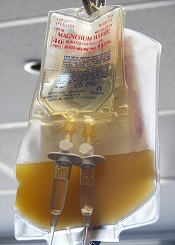
Scientists say they’ve discovered a way to create a potentially inexhaustible supply of functional platelets.
The researchers used human induced pluripotent stem cells (iPSCs) to create immortalized megakaryocyte progenitor cell lines (imMKCLs). And by manipulating the cell lines, the team produced platelets.
These imMKCL-derived platelets were functional, although not as functional as donor-derived platelets.
On the other hand, the imMKCL-derived cells offer an advantage over donated platelets—namely, the imMKCLs can be expanded in culture for up to 5 months, even after cryopreservation.
“[W]e established a method to achieve the long-term self-replication of megakaryocyte progenitors as an immortalized cell line, which could eventually contribute to large-scale cultivation and production of platelets,” said senior study author Koji Eto, MD, PhD, of Kyoto University and the University of Tokyo in Japan.
He and his colleagues believe this work, published in Cell Stem Cell, could eventually help us eliminate platelet shortages. The supply of donated platelets, which have a short shelf-life and must be kept at room temperature, is often insufficient to meet clinical needs.
With that in mind, Dr Eto’s team set out to create large quantities of functional platelets. They first generated stable imMKCLs from iPSC-derived hematopoietic progenitors.
They accomplished this by inducing overexpression of BMI1 and BCL-XL to suppress senescence and apoptosis. They also induced constrained overexpression of c-MYC to promote proliferation, as they found too-high c-MYC expression led to caspase-dependent MKCL apoptosis.
When the researchers turned off expression of c-MYC, BMI1, and BCL-XL, they saw an increase in CD42b+ platelet yield from the imMKCLs and upregulated CD42b expression in CD41a+ platelets. They noted that expression of CD42b is required for clotting initiation and bacterial clearance in vivo.
The team then conducted in vitro and in vivo experiments to test the functionality of their platelets. Most of the in vitro functional parameters indicated that imMKCL-derived platelets produced less robust responses than donor platelets.
But the imMKCL-derived platelets were functional enough to be useful and produced promising results in vivo. In mouse models of thrombocytopenia, the imMKCL-derived platelets contributed to thrombi development better than human endogenous pooled platelets.

